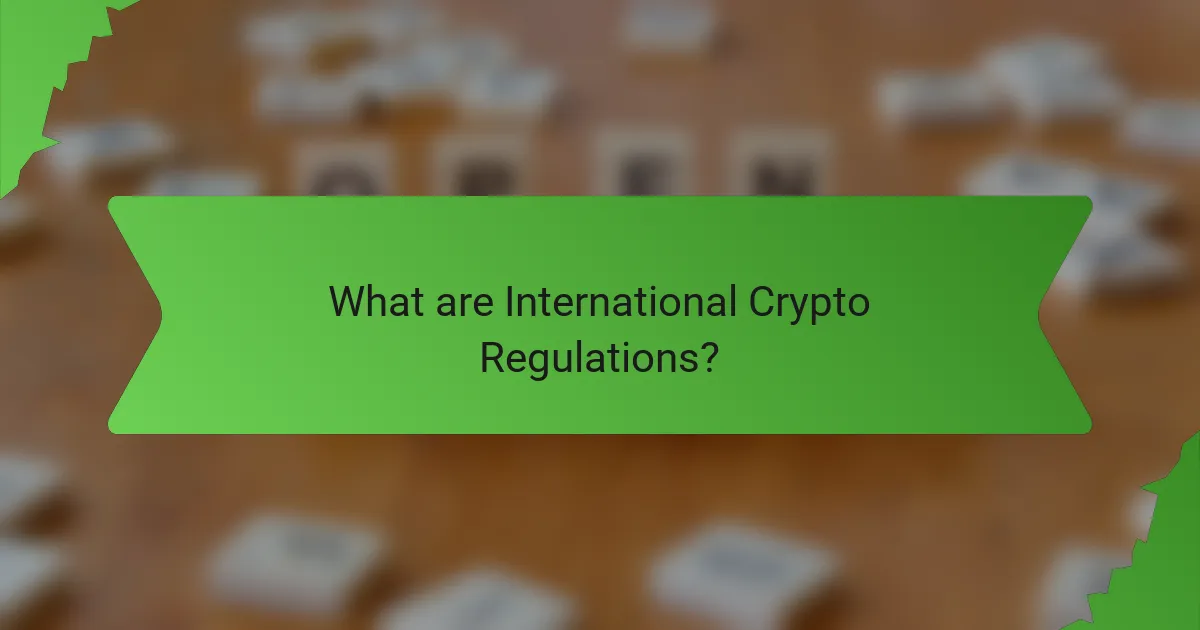International crypto regulations are legal frameworks established by governments and international organizations to oversee cryptocurrency activities, aimed at ensuring consumer protection, preventing money laundering, and promoting financial stability. The article provides a comparative analysis of global standards and practices in crypto regulations, highlighting key components such as anti-money laundering (AML) measures, know your customer (KYC) requirements, and taxation policies. It explores the challenges posed by the rapid evolution of technology and the lack of consensus among countries, while also discussing the opportunities that effective regulations present for consumer protection, innovation, and potential tax revenue. The evolving nature of these regulations is crucial for addressing the complexities of the digital currency landscape.

What are International Crypto Regulations?
International crypto regulations are legal frameworks established by governments and international organizations to govern cryptocurrency activities. These regulations aim to ensure consumer protection, prevent money laundering, and promote financial stability. Different countries have varying approaches to crypto regulations. For instance, the European Union has proposed the Markets in Crypto-Assets (MiCA) regulation to create a unified regulatory framework. In contrast, countries like China have imposed strict bans on cryptocurrency transactions. The Financial Action Task Force (FATF) provides guidelines that many nations adopt to combat illicit activities related to cryptocurrencies. Overall, international crypto regulations are evolving to address the challenges posed by digital currencies.
How do international crypto regulations vary across different countries?
International crypto regulations vary significantly from country to country. Some nations, like El Salvador, have adopted Bitcoin as legal tender. Others, such as China, have imposed strict bans on cryptocurrency transactions and mining. The United States has a more fragmented approach, with regulations differing by state. Countries in the European Union are working towards a unified regulatory framework through the Markets in Crypto-Assets (MiCA) proposal. In contrast, countries like Switzerland embrace crypto with favorable regulations, promoting innovation. The regulatory landscape is still evolving, with many countries reassessing their positions on digital currencies. This variation reflects differing economic priorities, risk perceptions, and technological adoption levels.
What are the key regulatory frameworks in major economies?
Key regulatory frameworks in major economies include the European Union’s Markets in Crypto-Assets (MiCA) regulation, the United States’ Securities and Exchange Commission (SEC) guidelines, and the Financial Conduct Authority (FCA) regulations in the United Kingdom. MiCA aims to create a unified legal framework for cryptocurrencies across EU member states. The SEC focuses on classifying cryptocurrencies as securities, impacting their trading and issuance. The FCA regulates crypto assets to protect consumers and ensure market integrity. These frameworks reflect diverse approaches to crypto regulation globally, addressing risks and fostering innovation.
How do cultural and economic factors influence these regulations?
Cultural and economic factors significantly influence international crypto regulations. Cultural attitudes towards technology and finance shape how countries view cryptocurrency. For instance, nations with a strong emphasis on innovation tend to adopt more progressive regulations. Economic conditions also play a crucial role. Countries facing economic instability may tighten regulations to control capital flight. Conversely, nations with robust economies may encourage crypto adoption to foster growth. Historical context further illustrates these influences. In countries with a history of financial crises, regulations often reflect a cautious approach. Overall, the interplay of cultural values and economic realities drives the regulatory landscape in the crypto space.
Why are international crypto regulations important for the global economy?
International crypto regulations are crucial for the global economy as they promote stability and security in financial markets. These regulations help prevent fraud and financial crimes, which can undermine trust in digital currencies. By establishing clear guidelines, they enable businesses to operate within a legal framework, fostering innovation and investment. Additionally, harmonized regulations facilitate cross-border transactions and reduce compliance costs for companies. According to a report by the Financial Stability Board, effective regulations can mitigate systemic risks associated with cryptocurrencies. This ultimately supports economic growth and protects consumers.
What risks do unregulated cryptocurrencies pose to financial systems?
Unregulated cryptocurrencies pose significant risks to financial systems. These risks include market volatility, which can lead to sudden and extreme price fluctuations. Such volatility may undermine investor confidence and destabilize financial markets. Additionally, the lack of regulation facilitates illicit activities, such as money laundering and fraud. A report by the Financial Action Task Force (FATF) highlights that unregulated cryptocurrencies can be exploited for criminal purposes. Furthermore, unregulated entities may create systemic risks, as they operate outside traditional financial oversight. This can result in a lack of accountability and increased potential for financial crises. Lastly, unregulated cryptocurrencies may hinder the effectiveness of monetary policy by creating parallel financial systems.
How can regulations enhance consumer protection in crypto markets?
Regulations can enhance consumer protection in crypto markets by establishing clear guidelines and standards. These regulations can help prevent fraud and scams that are prevalent in the sector. By requiring exchanges to adhere to Know Your Customer (KYC) and Anti-Money Laundering (AML) practices, regulations can create a safer trading environment.
Furthermore, regulations can mandate transparency in operations and disclosures, allowing consumers to make informed decisions. Regulatory bodies can also provide frameworks for dispute resolution, giving consumers recourse in case of issues.
Additionally, consumer education initiatives may be included in regulatory frameworks, helping users understand risks associated with crypto investments. Statistics show that countries with stringent regulations report lower instances of fraud in crypto markets.
For example, the Financial Conduct Authority (FCA) in the UK has implemented regulations that have led to increased consumer trust and participation in the market. Such measures collectively enhance consumer protection and foster a more stable crypto ecosystem.

What are the key components of global crypto regulations?
Key components of global crypto regulations include anti-money laundering (AML) measures, know your customer (KYC) requirements, and taxation policies. AML measures aim to prevent illegal activities in cryptocurrency transactions. KYC requirements mandate that businesses verify customer identities to enhance transparency. Taxation policies address how cryptocurrencies are treated for tax purposes, influencing compliance. Additionally, regulatory frameworks often involve consumer protection laws and market integrity rules. These components work together to create a comprehensive regulatory environment. Countries worldwide are developing these regulations to adapt to the evolving crypto landscape.
What regulatory approaches are adopted by different jurisdictions?
Different jurisdictions adopt various regulatory approaches to cryptocurrency. For example, the United States employs a combination of federal and state regulations. The Securities and Exchange Commission (SEC) regulates cryptocurrencies deemed as securities. In contrast, the Commodity Futures Trading Commission (CFTC) oversees those classified as commodities.
The European Union has proposed a comprehensive framework known as the Markets in Crypto-Assets Regulation (MiCA). This aims to create uniform rules across member states. In Asia, jurisdictions like Japan have established a licensing system for cryptocurrency exchanges. This requires compliance with anti-money laundering regulations.
Countries like China have taken a strict approach, banning cryptocurrency trading and Initial Coin Offerings (ICOs). Meanwhile, nations such as El Salvador have embraced Bitcoin as legal tender. These varying approaches reflect differing attitudes towards innovation, risk, and consumer protection in the crypto space.
How do licensing requirements differ among countries?
Licensing requirements for cryptocurrencies vary significantly among countries. In the United States, regulations are primarily state-based, leading to a patchwork of requirements. For instance, New York has the BitLicense, while other states may have no specific regulations. In contrast, the European Union is working towards a unified regulatory framework through the Markets in Crypto-Assets (MiCA) proposal, which aims to standardize licensing across member states. Countries like Japan have established comprehensive licensing requirements for crypto exchanges, requiring registration with the Financial Services Agency. Meanwhile, nations such as China have imposed strict bans on cryptocurrency transactions and mining, resulting in no licensing framework. These differences reflect each country’s approach to risk management, consumer protection, and financial stability within the cryptocurrency market.
What are the implications of anti-money laundering (AML) and know your customer (KYC) regulations?
Anti-money laundering (AML) and know your customer (KYC) regulations aim to prevent financial crimes. These regulations require financial institutions to verify the identity of their clients. Compliance with AML and KYC helps mitigate risks related to money laundering and terrorist financing. Financial institutions face penalties for non-compliance, which can include hefty fines. The regulations also increase operational costs due to the need for enhanced due diligence processes. Additionally, they promote transparency in financial transactions. This can lead to greater trust among consumers and investors. Overall, AML and KYC regulations shape the landscape of financial services by enforcing accountability and security.
How do international organizations influence crypto regulations?
International organizations influence crypto regulations by establishing guidelines and frameworks for member countries. These organizations, such as the Financial Action Task Force (FATF), set standards for anti-money laundering and combating the financing of terrorism. Their recommendations encourage countries to adopt similar regulatory practices. This promotes consistency in regulations across borders. Additionally, international organizations provide technical assistance and training to help countries implement these standards. Their influence extends to shaping public policy and fostering dialogue among nations. For example, the IMF and World Bank often advocate for regulatory frameworks that support financial stability. This collaborative approach helps align national regulations with global best practices.
What role do the Financial Action Task Force (FATF) and the International Monetary Fund (IMF) play?
The Financial Action Task Force (FATF) sets international standards to combat money laundering and terrorist financing. It evaluates countries’ compliance with these standards. The FATF issues recommendations that guide nations in implementing effective regulatory frameworks. These recommendations include measures applicable to cryptocurrencies.
The International Monetary Fund (IMF) provides financial assistance and advice to member countries. It promotes global economic stability and growth. The IMF also supports the development of regulatory frameworks for financial systems, including those involving cryptocurrencies. It offers technical assistance to nations in implementing these frameworks.
Together, the FATF and IMF play crucial roles in shaping global financial regulations. Their efforts aim to enhance the integrity of financial systems worldwide. They help countries mitigate risks associated with cryptocurrencies and promote compliance with international standards.
How do treaties and agreements impact global regulatory practices?
Treaties and agreements shape global regulatory practices by establishing common frameworks and standards. They facilitate cooperation among nations, promoting consistency in regulations. For example, the Paris Agreement on climate change guides countries in setting environmental regulations. Similarly, trade agreements often include provisions for regulatory alignment, enhancing market access. These frameworks help to reduce barriers and foster international trade. They also encourage countries to adopt best practices, improving overall regulatory quality. The impact of such treaties is evident in sectors like finance, where the Basel Accords influence banking regulations worldwide. Thus, treaties and agreements play a crucial role in harmonizing global regulatory landscapes.

What are the challenges and opportunities in implementing crypto regulations?
Implementing crypto regulations presents both challenges and opportunities. One challenge is the rapid evolution of technology, which makes it difficult for regulators to keep pace. This can lead to outdated regulations that do not effectively address current issues. Another challenge is the lack of consensus among countries on regulatory frameworks, resulting in fragmented approaches. This can create confusion for businesses operating internationally.
On the opportunity side, effective regulations can enhance consumer protection. By establishing clear guidelines, regulators can help build trust in the crypto market. Additionally, regulations can foster innovation by providing a stable environment for businesses to operate. Countries that implement thoughtful regulations may attract investment and talent in the crypto space.
The potential for tax revenue from regulated crypto activities also presents an opportunity for governments. According to a 2021 report by the Financial Action Task Force, effective regulation can mitigate risks associated with money laundering and fraud. This underscores the importance of balancing regulation with innovation to harness the benefits of cryptocurrencies.
What are the main challenges faced by regulators worldwide?
Regulators worldwide face several main challenges. One significant challenge is the rapid pace of technological advancements. Innovations in cryptocurrency and blockchain outpace existing regulatory frameworks. This leads to uncertainty and potential regulatory gaps. Another challenge is the need for international cooperation. Different countries have varying regulations, which complicates enforcement and compliance. Additionally, regulators must address cybersecurity threats. The increasing frequency of cyberattacks on financial systems poses risks to consumer protection. Moreover, there is the challenge of balancing innovation with consumer safety. Regulators strive to foster innovation while ensuring market integrity. Lastly, the evolving nature of financial crime presents ongoing difficulties. Money laundering and fraud tactics continuously adapt, requiring regulators to remain vigilant.
How do technological advancements complicate regulatory frameworks?
Technological advancements complicate regulatory frameworks by introducing rapid changes that outpace existing laws. Emerging technologies like blockchain and cryptocurrencies create unique challenges for regulators. Traditional regulatory approaches often fail to address the decentralized nature of these technologies. This leads to gaps in compliance and enforcement. For example, the anonymity provided by cryptocurrencies can hinder anti-money laundering efforts. Furthermore, the global nature of technology complicates jurisdictional issues. Different countries may have conflicting regulations, creating uncertainty for businesses. As a result, regulators must continuously adapt to keep pace with innovation.
What are the enforcement challenges in cross-border crypto transactions?
Enforcement challenges in cross-border crypto transactions include jurisdictional issues, regulatory discrepancies, and anonymity of transactions. Jurisdictional issues arise because different countries have varying laws regarding cryptocurrencies. This creates difficulties in determining which country’s regulations apply. Regulatory discrepancies lead to conflicts between national laws, complicating enforcement actions. Anonymity of transactions makes it hard to trace the parties involved. This obscurity can facilitate illicit activities. Additionally, the rapid evolution of technology outpaces regulatory frameworks. Law enforcement agencies often lack the necessary tools and expertise to track crypto transactions effectively. These challenges hinder the ability to enforce compliance and uphold financial regulations across borders.
What opportunities arise from harmonizing international crypto regulations?
Harmonizing international crypto regulations creates opportunities for global market integration. It facilitates cross-border transactions, reducing barriers for businesses and consumers. A unified regulatory framework enhances investor confidence. This can lead to increased capital inflow into the crypto market. Additionally, harmonization promotes innovation in blockchain technologies. It allows for standardized compliance processes, reducing costs for companies. Countries can collaborate on cybersecurity measures, enhancing overall security in the crypto space. According to a report by the World Economic Forum, consistent regulations can significantly boost the adoption of cryptocurrencies globally.
How can standardization benefit global trade and investment in cryptocurrencies?
Standardization can enhance global trade and investment in cryptocurrencies by creating uniform regulations. This uniformity fosters trust among investors and traders across different jurisdictions. It reduces the risks associated with regulatory discrepancies, which can lead to confusion and potential losses. Standardized practices can simplify compliance for businesses operating internationally. They can also lower transaction costs by streamlining processes and reducing the need for extensive legal consultations. According to the World Economic Forum, standardization could increase the market size for cryptocurrencies by encouraging wider adoption. Additionally, it can facilitate smoother cross-border transactions, making it easier for companies to engage in international trade. Overall, standardized regulations can lead to a more stable and predictable environment for cryptocurrency investments.
What role does collaboration between nations play in effective regulation?
Collaboration between nations is crucial for effective regulation in the context of international crypto regulations. This collaboration helps harmonize standards and practices across different jurisdictions. It enables countries to share information on best practices and regulatory challenges. By working together, nations can address issues such as money laundering and fraud more effectively. Collaborative frameworks can lead to the establishment of global standards, reducing regulatory arbitrage. For instance, the Financial Action Task Force (FATF) promotes international cooperation to combat financial crimes. This cooperation enhances regulatory effectiveness and fosters trust among nations. Ultimately, collaboration leads to a more secure and stable global financial environment.
What best practices can be adopted for effective crypto regulation?
Effective crypto regulation can be achieved through several best practices. First, establishing clear legal frameworks is essential. These frameworks should define cryptocurrencies and related activities. They must also outline regulatory authorities’ roles and responsibilities. Second, promoting transparency is crucial in crypto transactions. This can be done through mandatory reporting requirements for exchanges. Third, implementing robust anti-money laundering (AML) and know-your-customer (KYC) regulations helps mitigate risks. These measures ensure that crypto platforms verify user identities. Fourth, fostering international cooperation among regulators enhances enforcement effectiveness. Collaboration can lead to harmonized standards across jurisdictions. Finally, continuous education and outreach to stakeholders are vital. This helps users understand the regulatory landscape and compliance obligations.
How can regulators balance innovation with consumer protection?
Regulators can balance innovation with consumer protection by implementing adaptive regulatory frameworks. These frameworks should promote technological advancement while ensuring consumer safety. Regulators must engage in continuous dialogue with industry stakeholders. This helps to understand emerging technologies and their implications. Establishing clear guidelines can foster innovation without compromising consumer rights. For instance, sandbox models allow companies to test products under regulatory oversight. This approach mitigates risks while promoting responsible innovation. Studies show that effective regulation can enhance market confidence, leading to greater consumer participation. Thus, proactive regulation can achieve a balance between innovation and protection.
What lessons can be learned from countries with successful regulatory frameworks?
Countries with successful regulatory frameworks demonstrate the importance of clear guidelines. They establish transparent rules that foster trust among stakeholders. Effective communication between regulators and the industry is crucial. This collaboration helps in adapting to technological advancements. Additionally, successful countries often implement a risk-based approach to regulation. This allows them to focus resources on higher-risk areas. Regular reviews of regulations ensure they remain relevant and effective. Examples include the UK’s Financial Conduct Authority and Singapore’s Monetary Authority, which have both created adaptive regulatory environments. These lessons highlight the need for flexibility and stakeholder engagement in regulatory practices.
The main entity of this article is international crypto regulations, which encompass legal frameworks established by governments and organizations to oversee cryptocurrency activities. The article provides a comparative analysis of global standards and practices, highlighting the varying approaches to regulations across different countries, including the European Union’s Markets in Crypto-Assets proposal, the United States’ fragmented regulations, and China’s strict bans. It explores the key components of these regulations, such as anti-money laundering (AML) and know your customer (KYC) measures, and discusses the influence of cultural and economic factors on regulatory practices. Additionally, the article examines the implications of these regulations for consumer protection, financial stability, and the global economy, while addressing the challenges and opportunities presented by the evolving crypto landscape.




